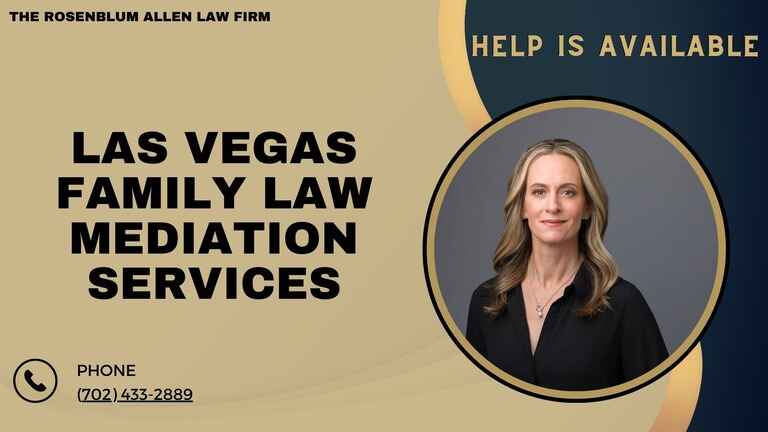What Are Family Law Mediation Services?

Definition of Family Law Mediation
Explanation of Mediation
Family law mediation is a process where a neutral third party, known as a mediator, helps couples resolve their disputes. This can include issues like divorce, child custody, and property division. The mediator doesn’t take sides but allows both parties to communicate and reach a mutually agreeable solution.
Role of the Mediator
The mediator’s role is facilitating discussions, ensuring both parties are heard, and guiding the process. They don’t make decisions but help the parties find common ground. Think of them as referees who keep the conversation fair and productive.
Differences Between Mediation and Litigation
Unlike litigation, where a judge makes the decisions, mediation allows the parties to control the outcome. It’s less formal, more private, and often quicker. Litigation can be adversarial and stressful, while mediation focuses on cooperation and finding solutions that work for both parties.
Benefits of Family Law Mediation
Cost-Effectiveness
Mediation is generally cheaper than going to court. You save on attorney fees, court costs, and other expenses. Plus, since it’s faster, you spend less time away from work and family.
Confidentiality
What you discuss in mediation stays in mediation. Unlike public court cases, mediation sessions are private, so your matters remain confidential.
Time Efficiency
Mediation can be scheduled at your convenience and often resolves disputes faster than the court system. This means less waiting and more moving forward with your life.
Control and Flexibility
You have more control over the process and the outcome in mediation. You can tailor agreements to fit your unique needs and circumstances rather than having a one-size-fits-all ruling from a judge.
Preservation of Relationships
Mediation fosters a cooperative environment, which can help preserve relationships. This is especially important when children are involved, as it sets a foundation for effective co-parenting.

Why Choose Mediation for Family Law Disputes in Las Vegas?
Common Family Law Issues Addressed in Mediation
Divorce and Separation
Mediation can help you and your spouse agree on the terms of your divorce, including asset division and alimony. This can make the divorce process smoother and less contentious.
Child Custody and Visitation
Mediation is ideal for resolving child custody and visitation issues. You can work out a parenting plan that suits both parents and is in the child’s best interest.
Child Support
Determining child support can be complex. Mediation allows you to discuss your financial situation openly and agree on a fair amount of support.
Spousal Support
Spousal support, also known as alimony, can be a sensitive topic. Mediation helps you discuss it calmly and reach a fair agreement.
Property Division
Dividing property and assets can be contentious. Mediation helps you and your spouse decide who gets what without a court battle.
Why Mediation Is Preferred Over Court Trials
Less Adversarial Process
Mediation is less aggressive than court. It focuses on collaboration and finding solutions, making it a less stressful experience.
Customizable Solutions
In mediation, you can create solutions tailored to your specific needs. This flexibility is often not available in court rulings.
Reduced Emotional Stress
Court battles can be emotionally draining. Mediation is typically a calmer process, which can reduce stress and help you focus on moving forward.
How to Start Family Law Mediation in Las Vegas
Steps Involved in Family Law Mediation
Initial Consultation and Agreement to Mediate
The first step is to have an initial consultation. This is where you learn about mediation and decide if it’s right for you. If both parties agree, you’ll sign an agreement to mediate.
Selection of a Mediator
Next, you’ll choose a mediator. It’s essential to select someone experienced and neutral. You can find mediators through local bar associations, online directories, or personal recommendations.
Mediation Sessions
Mediation sessions are scheduled at times convenient for both parties and typically last a few hours. During these sessions, the mediator guides discussions and helps you reach an agreement.
Drafting the Mediation Agreement
Once you’ve reached an agreement, the mediator will draft a mediation agreement. This document outlines the terms you’ve agreed on and can be reviewed by your attorneys.
Court Approval (if necessary)
In some cases, the mediation agreement will need to be approved by the court. This process is usually straightforward, especially if the deal is fair and meets legal requirements.
Preparation for Mediation
Gathering Necessary Documents
Collect all relevant documents, such as financial statements, property deeds, and existing legal agreements. Having these ready will help the mediation process go smoothly.
Identifying Key Issues
Think about the key issues you want to address in mediation. This could include child custody, support payments, or property division. Knowing your priorities will help you stay focused during sessions.
Setting Goals and Priorities
Set clear goals and priorities for what you want to achieve in mediation. This will help you stay on track and ensure you get the most out of the process.
Legal Representation and Advice
While mediation is less formal than court, having legal representation is still a good idea. Your attorney can provide advice and make sure your rights are protected throughout the process.
By understanding and preparing for these steps, you can make the most of family law mediation and find resolutions that work for everyone involved.

Finding the Right Family Law Mediator in Las Vegas
Qualities of a Good Family Law Mediator
Finding the right mediator is essential for a successful mediation process. Here are some qualities to look for:
Experience and Expertise
Look for a mediator with substantial experience in family law. They should have a strong understanding of divorce, child custody, and other related issues. An experienced mediator can navigate complicated situations and offer valuable insights.
Neutrality and Impartiality
A good mediator remains neutral and unbiased. They should facilitate discussions without taking sides. Their goal is to help both parties reach a fair agreement.
Communication Skills
Effective communication is key in mediation. The mediator should be able to clearly explain the process, listen actively, and help both parties express their concerns and needs.
Problem-Solving Abilities
Mediators should be skilled problem solvers. They need to think creatively to help both parties find workable solutions. This is especially important when dealing with sensitive and emotional issues.
Questions to Ask Potential Mediators
When interviewing potential mediators, consider asking the following questions:
- What is your experience with family law mediation?
- How do you approach the mediation process?
- What are your fees and billing practices?
- Can you provide references or testimonials?
Resources for Finding Mediators
Here are some resources to help you find the right mediator:
Local Bar Associations
Many bar associations have lists of qualified mediators. They can provide recommendations based on your specific needs.
Online Directories
There are several online directories that list mediators by location and specialty. Websites like Mediate.com can be a good starting point.
Personal Recommendations
Ask friends, family, or colleagues if they can recommend a good mediator. Personal referrals can provide valuable insights into the mediator’s style and effectiveness.
Legal Aid Organizations
Legal aid organizations often have resources and referrals for mediation services. They can help you find affordable options if you are on a tight budget.
Costs Associated with Family Law Mediation in Las Vegas
Factors Affecting the Cost of Mediation
Several factors can influence the cost of mediation:
- Mediator’s Fees: Fees can vary widely depending on the mediator’s experience and reputation.
- Duration of Mediation: Longer cases will typically cost more due to the increased time required.
- Complexity of Issues: More complicated cases may require more sessions and therefore cost more.
- Additional Costs: You might need to pay for extra services like legal advice or document preparation.
Comparing Costs of Mediation vs. Litigation
Here’s a table comparing the typical costs of mediation and litigation:
| Aspect | Mediation | Litigation |
|---|---|---|
| Hourly Rates | Lower | Higher |
| Total Cost | Generally Lower | Generally Higher |
| Court Fees | Minimal | Significant |
| Time Investment | Shorter | Longer |
| Emotional Stress | Lower | Higher |
Mediation is often more cost-effective than litigation. It can save you money in the long run and help you avoid the high costs associated with court battles.

Legal Considerations in Family Law Mediation
Ensuring Agreements Are Legally Binding
To make sure your mediation agreement holds up legally, follow these steps:
Writing the Agreement
The mediator will help draft the agreement based on the terms you’ve negotiated. This document should clearly outline all agreed-upon terms.
Reviewing with Legal Counsel
It’s wise to have your attorney review the agreement. They can make sure it protects your rights and meets all legal requirements.
Submitting the Agreement to Court
In some cases, the agreement must be submitted to the court for approval. This is usually a formality but makes sure the agreement is enforceable.
Rights and Obligations in Mediation
Understanding your rights and obligations is essential:
Understanding Legal Rights
Know your legal rights before entering mediation. Your attorney can help you understand what you’re entitled to under the law.
Voluntary Participation
Mediation is voluntary. Both parties must agree to participate and can withdraw at any time if they feel it’s not working.
Confidentiality Agreements
Mediation sessions are confidential. This means discussions and agreements made during mediation cannot be used in court if the mediation doesn’t result in a settlement.
Practical Tips for Successful Mediation
Communication Strategies
Effective communication can make a big difference:
Active Listening
Listen carefully to the other party without interrupting. This shows respect and can help you understand their perspective.
Expressing Needs and Concerns
Clearly state your needs and concerns. Be honest and direct, but also respectful.
Maintaining a Respectful Tone
Keep the tone of the conversation respectful. Avoid blaming or criticizing, which can escalate tensions.
Emotional Preparedness
Being emotionally prepared can help you handle the mediation process better:
Managing Stress and Emotions
Mediation can be stressful. Practice stress management techniques like deep breathing or mindfulness to stay calm.
Seeking Support from Friends or Professionals
Talk to friends, family, or a therapist about your feelings. Having support can help you cope with the emotional aspects of mediation.

Breaking It All Down
Family law mediation offers many benefits. It’s cost-effective, confidential, and faster than litigation. You have more control over the outcome and can create customized solutions. The process involves selecting a mediator, holding mediation sessions, and drafting an agreement. With the proper preparation, mediation can help you resolve disputes amicably.

Frequently Asked Questions
What Is Family Law Mediation?
Family law mediation is a process where a neutral third party, called a mediator, helps couples resolve divorce, child custody, support, and property division disputes. The mediator facilitates communication and guides both parties toward a mutually acceptable agreement.
How Does Mediation Differ from Going to Court?
Mediation is less formal and more private than court proceedings. In mediation, the parties control the outcome rather than having a judge decide. It is typically quicker, less adversarial, and more cost-effective than litigation.
What Are the Benefits of Choosing Mediation?
Mediation offers several benefits, including lower costs, confidentiality, quicker resolution, more control over outcomes, and a less stressful environment. It also helps preserve relationships, especially when children are involved.
Who Can Benefit from Family Law Mediation?
Mediation can benefit any couple dealing with issues related to divorce, child custody, child support, spousal support, or property division. It benefits those who wish to resolve their disputes amicably and maintain a cooperative relationship.
How Do I Start the Mediation Process?
To start the mediation process, you first need an initial consultation with a mediator to understand the process and decide if it’s right for you. If both parties agree, you will select a mediator and schedule mediation sessions.
What Should I Bring to a Mediation Session?
You should bring all relevant documents, such as financial statements, property deeds, and existing legal agreements. Having these documents ready will help the mediation process go smoothly.
How Long Does Mediation Take?
The duration of mediation varies depending on the complexity of the issues and the willingness of both parties to cooperate. Sessions typically last a few hours, and the process can take anywhere from a few weeks to a few months.
Is Mediation Legally Binding?
Agreements reached in mediation can be legally binding if they are put into writing and reviewed by legal counsel. In some cases, the agreement must also be submitted to the court for approval to ensure its enforceability.
Can I Have Legal Representation During Mediation?
Yes, it is recommended that you have legal representation during mediation. Your attorney can provide advice, review the mediation agreement, and ensure that your rights are protected throughout the process.
What Happens If Mediation Fails?
If mediation does not result in an agreement, you can still pursue litigation. The discussions and offers made during mediation are confidential and cannot be used in court, allowing you to explore other avenues for resolution.
How Much Does Mediation Cost?
Mediation costs vary depending on factors such as the mediator’s fees, the duration of the mediation, and the complexity of the issues. Generally, mediation is more cost-effective than litigation.
How Do I Choose a Good Mediator?
When choosing a mediator, look for qualities such as experience in family law, neutrality, strong communication skills, and problem-solving abilities. You can find mediators through local bar associations, online directories, personal recommendations, and legal aid organizations.
Are Mediation Sessions Confidential?
Yes, mediation sessions are confidential. This means that anything discussed during mediation cannot be used in court if the mediation does not result in a settlement.
What Is the Role of a Mediator?
The mediator’s role is to facilitate discussions, ensure both parties are heard, and guide the process toward a mutually agreeable solution. They do not make decisions but help the parties find common ground and resolve their disputes amicably.
Can Mediation Help with Child Custody and Support Issues?
Yes, mediation is particularly effective for resolving child custody and support issues. It allows parents to work together to create a parenting plan that is in the child’s best interest while maintaining a cooperative relationship.
What Should I Expect During a Mediation Session?
During a mediation session, the mediator guides discussions and helps both parties express their concerns and needs. The goal is to reach a mutually acceptable agreement on the issues. Sessions are typically less formal and more flexible than court proceedings.
Is Mediation Voluntary?
Yes, mediation is a voluntary process. Both parties must agree to participate and can withdraw at any time if they feel the process is not working.
How Can I Prepare Emotionally for Mediation?
To prepare emotionally for meditation, practice stress management techniques like deep breathing or mindfulness. Seek support from friends, family, or a therapist to help you cope with the emotional aspects of mediation and stay focused on resolving.

Additional Resources for You from The Rosenblum Allen Law Firm.
Our lead attorney, Molly Rosenblum Allen, Esq., has also created a suite of valuable resources to assist you during challenging times. Here are some of the comprehensive guides available:
- Las Vegas Divorce Attorney: Gain insights into navigating the complexities of divorce proceedings in Las Vegas.
- Nevada Divorce: Explore the specifics of divorce in Nevada with detailed guidance on state-specific laws and processes.
- Surviving Divorce: Discover strategies and support for coping with the emotional and practical aspects of divorce.
- What Happens If You Don’t Sign Divorce Papers: Understand the implications and legal processes if one party is uncooperative or refuses to sign divorce papers.
- Do I Need an Attorney to Get a Divorce: Decipher whether legal representation is necessary for your divorce and how an attorney can assist in your case.
- What is a Collaborative Divorce: Get informed about collaborative divorce, an alternative to traditional divorce proceedings, focusing on mutual agreement and cooperation.
- How to Win a Divorce: Understand strategies that might be employed to ensure a favorable outcome in your divorce proceedings.
- Switching Lawyers During Divorce: Know the process, benefits, and considerations of changing your legal representation mid-divorce.
- How Long Does a Divorce Take in Nevada: Familiarize yourself with the timeline and factors that influence the duration of divorce proceedings in Nevada.
- High Conflict Divorce: Gain insights into navigating and resolving high-stakes and high-conflict divorce scenarios.
- Questions to Ask a Divorce Lawyer: Prepare for consultations and legal proceedings by exploring the crucial questions to ask your divorce lawyer.
These resources are meticulously crafted to address specific needs and questions that arise during the divorce process. Molly Rosenblum Allen, Esq., is committed to providing support and clarity during these challenging times.

Offsite Resources for You
- American Bar Association (ABA): A premier resource for legal professionals that also offers a wealth of information for the public on family law issues.
- National Parent Teacher Association (PTA): Provides resources and support for parents navigating challenges, including those associated with changes in family structure.
- National Domestic Violence Hotline: Offers essential support and information for individuals facing domestic violence situations, which can be a component of divorce cases.
- KidsHealth: Provides advice on many aspects of child health and development, including coping with parental separation and divorce.
- Wealth Management: Offers financial advice that can be crucial when dealing with the economic aspects of divorce, such as alimony and property division.
- Psychology Today: Features a range of articles by mental health professionals that can offer support and guidance through the psychological impact of divorce.
- FindLaw: A comprehensive legal resource providing detailed articles on divorce, legal separation, and family law matters.

A Special Message from Our Lead Attorney, Molly Rosenblum Allen, Esq

Thank you for taking the time to explore the comprehensive resources we’ve provided.
We hope you have found the information valuable and informative during this challenging time.
If you’re ready to take the next step or have any questions regarding your situation, please don’t hesitate to reach out.
You can call me and my team at (702) 433-2889, and we will be ready to assist you.
We understand the difficulties and emotional challenges that legal issues can bring, and we are here to provide the support and guidance you need.
Warm regards,
Molly Rosenblum, Esq.






